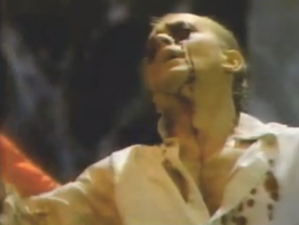 The Theban Plays, a trilogy of Sophocles’ tragedies Oedipus the King, Oedipus at Colonus and Antigone, was broadcast on BBC2 over three evenings of one week in September 1986 (and all three are available on YouTube). The plays were translated and directed by Don Taylor who would, four years later in 1990, turn to Euripides’ Iphigenia at Aulis which is, to the best of my knowledge, the last Greek tragedy to be produced on British television. My work on these four Don Taylor productions, then, forms the last chapter of my Greeks on Screen case study.
The Theban Plays, a trilogy of Sophocles’ tragedies Oedipus the King, Oedipus at Colonus and Antigone, was broadcast on BBC2 over three evenings of one week in September 1986 (and all three are available on YouTube). The plays were translated and directed by Don Taylor who would, four years later in 1990, turn to Euripides’ Iphigenia at Aulis which is, to the best of my knowledge, the last Greek tragedy to be produced on British television. My work on these four Don Taylor productions, then, forms the last chapter of my Greeks on Screen case study.
I’m going to consider The Theban Plays trilogy separately in this and two subsequent posts. (The Theban Plays, of course, make up a modern rather than an ancient trilogy: these three plays were not intended to be staged on the same day in ancient Athens – as was, for example, Aeschylus’ Oresteia – but the closeness of their mythical subject matter makes it easy for modern translators, publishers and theatrical practitioners to consider them a ‘trilogy’ for publication or performance together.)
Speaking to the City: Sophocles Then and Now documentary
In this the first of the three posts I’m going to look at not only Oedipus the King but also the accompanying documentary which prefaced The Theban Plays. Entitled Speaking to the City: Sophocles Then and Now, and broadcast on Sunday 14 September 1946 at 8.40pm on BBC2, this twenty-five-minute programme uses an interesting format to interest and attract the potential audience for The Theban Plays. The programme is, we are told by Don Taylor in voice-over, an edited form of a ‘spontaneous and unrehearsed’ discussion between actors who played in the trilogy.
In his introduction, Taylor goes on to say that his model is the ancient Greek symposium, or drinking-party, and accordingly the setting is very much the model of a library of a gentleman’s club. Not only do floor-to-ceiling bookshelves, interspersed with classical columns, serve as background for rows of middle-aged and older men, suited and smoking, but there is also a marked paucity of women. Only Juliet Stevenson, who plays Antigone in Oedipus at Colonus and Antigone, is present amidst the nineteen men. Admittedly, there is not a large number of female characters in the these three plays of Sophocles, but it would surely have been more fitting to have some of these also present at this discussion, perhaps Claire Bloom (Jocasta), Rosalie Crutchley (Eurydice), Gwen Taylor (Ismene) and some of the eight of so silent female actors who helped to make up the crowd of Theban citizens in the first play. Stevenson offers some intelligent and thoughtful insights and, although the men are superbly interesting and entertaining, it would have been valuable to have much more from the female perspective. (One wonders whether one of the camera operators felt this too, who was focused on Stevenson as she started to speak at one point and who continued to keep the camera’s gaze on her long after a male actor interrupted to give his point of view – or was this just an awkward practicality of shooting a ‘live’ discussion?)
Following an introductory voice-over from Taylor, an approach I have come across before when researching ancient Greek material presented in mass media formats is used to kick proceedings off. ‘Well, I’ve never read a word of Sophocles – not one. In fact, I’ve resisted it. I’ve only got to look at a book that says Sophocles and I say I don’t want to read it!’, admits Anthony Quayle (who plays Oedipus in Oedipus at Colonus). He continues, ‘Then I was asked […] and I was very flattered so straight off I said yes’. Thus the documentary opens with the idea that the ancient Greeks, perhaps especially on the page, are somehow off-putting, daunting or uninteresting, but are quite something else in performance, a persuasive tactic no doubt intended to attract undecided viewers.
Stevenson then talks about how she finds that the plays ‘encompass a scale which you very rarely get asked to call upon, as an actor, nowadays unless you’re doing Shakespeare or something like that’ and that ‘the challenge of these plays is that they require you to dig down very deep and to scale whatever you produce, up from the pit of yourself, very uncompromisingly large’. She found the morality of the plays very attractive, and how it chimed very loudly with the concurrent case of the civil servant Sarah Tisdall who was being prosecuted for leaking to The Guardian details of when American cruise missile would be arriving in the UK. Playing Antigone at this time resonated strongly, then, with current affairs: ‘The comparisons between those two cases leapt very clearly off the page. It seemed to have a lot of relevance, and it wasn’t something that playwrights were writing about at the time’.
The discussion continues along several strands, including what Quayle describes as the inexorability of the plays and the absence of any notion of foregiveness and the echoes of the plays in later drama (‘The realisation that Colonus is a prequel of King Lear, Waiting for Godot … ’). The actors’ thoughts on the convention of the chorus (‘a conglomerate of energy forces’, ‘a leading role’, ‘a hydra-headed character’) lead into Taylor’s voiceover which talks about the dramatic function of the Greek chorus, followed by an extract from Oedipus the King and the actors’ sharing their thoughts about playing in a chorus.
The programme ends with a nice bit of ring composition as the credits roll. ‘I knew practically nothing about Sophocles. I was amazed to find the relevance and the guts of the thing, and I think many more people — it’s not just a sort of cultural minority — I think a lot of people are going to be amazed and say, my god, I didn’t realise how alive this was, and how relevant’, says one actor. Quayle backs him up, building on his earlier comments:
I started by saying that I had been crassly prejudiced against even reading Sophocles all my life — grossly, stupidly. But having gone through the experience now — to answer your question how it will come over on television, how will it be received — I would have thought that if people could overcome the sort of idiot prejudice I had, if they would only overcome it […] I can’t believe that they won’t be totally hooked. Absolutely. […] It’s the most absorbing story. The most wonderful, wonderful stories.
The ‘common heritage’ and the television medium
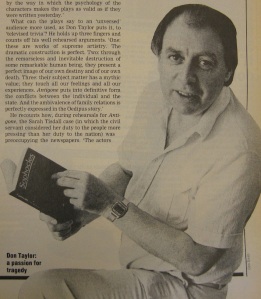 This theme of overcoming prejudice and being open to the plays on their own terms is underscored by a feature article over three pages of the Radio Times (Jim Crace, ‘Classics for Pleasure’, 13 September 1986, pp. 82-85): ‘The danger, of course, is that the modern television “masses” will be frightened away by the sheer antiquity of the Theban plays’. The advice given to the potential audience by Taylor and some of the actors quoted in this article is essentially two-fold: approach the plays as ‘works of supreme artistry’ but be open to the connections between the issues they present and present -day concerns, referring to what Stevenson says in the documentary about the resonances with the Sarah Tisdall case that playing Antigone held for her.
This theme of overcoming prejudice and being open to the plays on their own terms is underscored by a feature article over three pages of the Radio Times (Jim Crace, ‘Classics for Pleasure’, 13 September 1986, pp. 82-85): ‘The danger, of course, is that the modern television “masses” will be frightened away by the sheer antiquity of the Theban plays’. The advice given to the potential audience by Taylor and some of the actors quoted in this article is essentially two-fold: approach the plays as ‘works of supreme artistry’ but be open to the connections between the issues they present and present -day concerns, referring to what Stevenson says in the documentary about the resonances with the Sarah Tisdall case that playing Antigone held for her.
Don Taylor, who is described in the article as ‘not so much an elitist as an old-fashioned populist with a mission to liberate great literature, great drama, great opera from the preserve of the ruling or moneyed cliques’:
‘Art belongs to us all’, [Taylor] says. ‘It is a common heritage. And that has been my aim with my new version of the Theban plays, to make the works of Sophocles available to my own people, my own class’. For such an enterprise, the modern theatre is not suitable. Its audiences comprise ‘bourgeois intellectuals, students and tourists’. For Taylor, the rediscovery of Sophocles belongs on ‘what has become the whole nation’s medium – television’.
Taylor had first come across Sophocles at his Chiswick Grammar School in the 1950s and, convinced that existing translations were not sufficiently actable, he wrote his own verse translation of the three plays (although, since he was working from other translations and not from the Greek, perhaps ‘adaptation’ would be more accurate); this was published in the same year by Methuen.
Oedipus the King
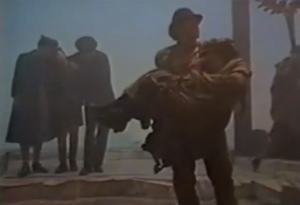 On Tuesday 16 September 1986, The Theban Plays opened with Oedipus the King on BBC2. At two hours and ten minutes long, from 8.30pm, it is a long, and at times ponderous, production. Taylor gives full expression to the original play: there are no significant cuts, and the script is delivered with remarkable relaxation. This leisure goes some way to explain how a play consisting of 1530 lines can take almost two hours! At several points, the actors slow movements on and off stage are set to orchestral music. Taylor, for example, takes over four minutes over the assembling of the crowd of citizens at the start of the play. At first visible as mere slowly moving shadows in a foggy scene, soon they are distinguishable as the sick being cared for, carried, brought on stretchers and in barrows. The music, as it would need to be over this length of time, is evocative. Certainly, the relaxed pace allows the pitiful state of the crowd to be fully apprehended, but these periods of orchestral interlude can become a little tiresome, especially since there is little variation in the orchestral themes.
On Tuesday 16 September 1986, The Theban Plays opened with Oedipus the King on BBC2. At two hours and ten minutes long, from 8.30pm, it is a long, and at times ponderous, production. Taylor gives full expression to the original play: there are no significant cuts, and the script is delivered with remarkable relaxation. This leisure goes some way to explain how a play consisting of 1530 lines can take almost two hours! At several points, the actors slow movements on and off stage are set to orchestral music. Taylor, for example, takes over four minutes over the assembling of the crowd of citizens at the start of the play. At first visible as mere slowly moving shadows in a foggy scene, soon they are distinguishable as the sick being cared for, carried, brought on stretchers and in barrows. The music, as it would need to be over this length of time, is evocative. Certainly, the relaxed pace allows the pitiful state of the crowd to be fully apprehended, but these periods of orchestral interlude can become a little tiresome, especially since there is little variation in the orchestral themes.
The set is an outdoor scene – the space in front of an enormous palace. Oedipus enters and speaks to the crowd from on high, at the top of the steps to the palace, and although this suggested power relation is underscored by his white suit and medals, contrasting starkly with the drab greys and browns of the dishevelled crowd, he does descend the steps to move amongst them and clasp their hands. Oedipus ascends the steps to continue exerting his authority as leader, but these steps become a bit of a bore when, following the arrival of his brother-in-law Creon who stands, amongst the people, Oedipus keeps running up and down the steps to make certain points.
 At this point in the production, I admit, I began to find things a little too ponderous. The cameramen do good work by introducing a good deal of variety into the shots, as much as the configuration of the set allows. But the fact remains that the slow and rather static nature of the production is a bit of a turn-off. One of the major difficulties, for me, was the representation of the chorus. Dressed, like judges of a certain era, in black suits and gowns (or cloaks) with white bow-ties and ruffled shirts, their delivery of their lines befits their appearance – they speak with authority and without great emotion.
At this point in the production, I admit, I began to find things a little too ponderous. The cameramen do good work by introducing a good deal of variety into the shots, as much as the configuration of the set allows. But the fact remains that the slow and rather static nature of the production is a bit of a turn-off. One of the major difficulties, for me, was the representation of the chorus. Dressed, like judges of a certain era, in black suits and gowns (or cloaks) with white bow-ties and ruffled shirts, their delivery of their lines befits their appearance – they speak with authority and without great emotion.
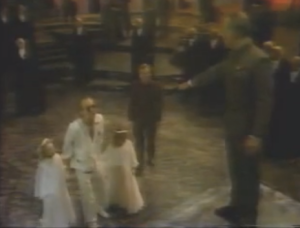 The presence of John Gielgud, who plays the blind seer Teiresias, is a treat: he brings an easy gravitas to the role. Michael Pennington delivers the role of Oedipus with a good mix of authority and uncertainty and Claire Bloom is a graceful and convincing Jocasta. The scenes between Oedipus and Creon (John Shrapnel) before Oedipus knows his true identity are played in one (rather shouty) key, but following Oedipus’ self-blinding the relationship is more nuanced. Now, of course, Creon has the authority: ‘Don’t give me orders. Those days are over. […] Now you must learn to obey’.
The presence of John Gielgud, who plays the blind seer Teiresias, is a treat: he brings an easy gravitas to the role. Michael Pennington delivers the role of Oedipus with a good mix of authority and uncertainty and Claire Bloom is a graceful and convincing Jocasta. The scenes between Oedipus and Creon (John Shrapnel) before Oedipus knows his true identity are played in one (rather shouty) key, but following Oedipus’ self-blinding the relationship is more nuanced. Now, of course, Creon has the authority: ‘Don’t give me orders. Those days are over. […] Now you must learn to obey’.
Hugh Hebert seems to hit the nail on the head regarding the problems of this production in his review for The Guardian: ‘Taylor chose to do it as theatre, as opera, not as television. […] I’d have liked […] a more sustained attempt to adapt to television’ (‘Televising the Thebans’, The Guardian, 17 September 1986, p. 9). The ‘old-fashioned populist’ (as the Radio Times, above, described Taylor) brought Sophocles out of the theatre and onto television but without an energetic attempt to think through what television could bring to Sophocles.
But I’ll refrain from passing judgement yet. Next up, we have Oedipus at Colonus, and then we’ll take a look at Antigone.

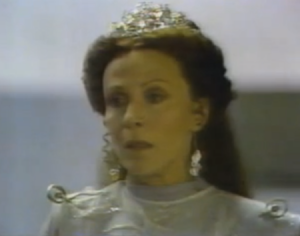
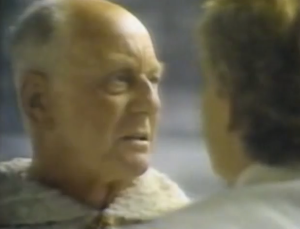
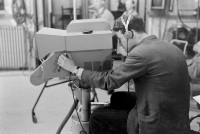
Discussion
Trackbacks/Pingbacks
Pingback: The Theban Plays At The BBC – WARREN ELLIS LTD - 2 April 2024